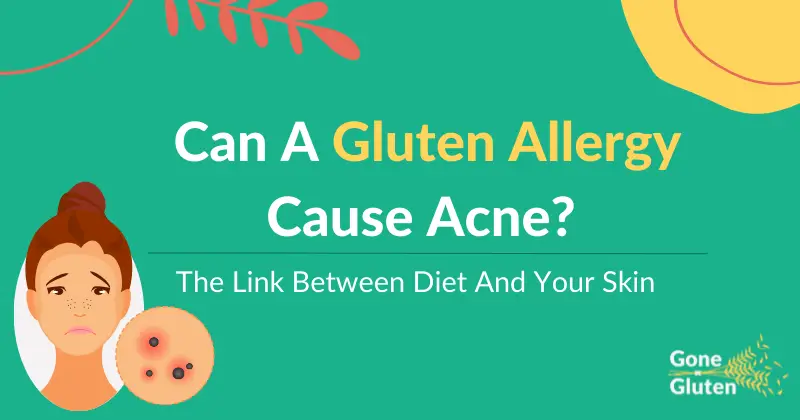We’ve all been there before… You wake up in the morning, look at yourself in the mirror, and then BAM! You notice an unsightly breakout that seemed to have developed overnight.
No matter how often you wash your face and exfoliate, your acne just won’t go away. I’m here to tell you that it might not be your hygiene. That being said, “Can a gluten allergy cause acne?”
There is no direct evidence that a gluten allergy can cause acne. However, acne is very commonly linked to gluten sensitivity and is a common reaction symptom in those with celiac disease. This means that there’s a fairly good chance that your gluten sensitivity, wheat allergy, or celiac disease could be contributing to your skin problem.
I know from firsthand experience that when I started my gluten-free diet, I noticed a dramatic decrease in pimples. I still get them from time to time, but my breakouts are far fewer and far between.
Today, I’ll explain the link between gluten sensitivity and your skin and show you some of the most common symptoms of a gluten allergy. You never know – a gluten-free diet might just be the skincare solution you’ve been looking for!

How Does Gluten Sensitivity Affect Your Skin?
Gluten is a big topic in today’s health news, and roughly 30% of Americans actively avoid gluten in their diets. All you have to do is go into a grocery store and pay attention to the labels to see that many of your favorite products go out of their way to brandish a noticeable “gluten-free” label to appeal to the increasing number of gluten-free dieters.
According to the latest statistics, around 18 million Americans are gluten sensitive. Although only 1% of the population has been diagnosed with celiac disease, there are still a bunch of people who experience some type of negative reaction when they consume gluten.
Everybody’s body chemistry is different and the degree of sensitivity ranges, depending on the person. Some people are fine consuming small amounts of gluten (a few crackers, a slice of toast, etc.), while others can have severe allergic reactions to trace amounts of gluten from cross-contamination.
If you’ve ever had an allergic reaction before, then you’re probably painfully aware of how it affects your skin. Gluten sensitivity, wheat allergy, and celiac disease are inflammatory in nature, which means they can affect your skin by causing breakouts, itchiness, and even swelling.
Can Gluten Cause Hives?

Hives are small, pale-colored, red bumps that almost always appear as a larger breakout. Typically, they’re limited to a small area; but in some cases, they can spread across your body. One of the most common symptoms of celiac disease and gluten allergies is a “gluten rash.”
Technically called dermatitis herpetiformis, a gluten rash looks very similar to hives. Only it’s far itchier and can even cause a stinging sensation. Depending on how sensitive your body is, these rashes can be caused by consuming just a small amount of gluten.
If you’re unsure of whether you have traditional hives or a gluten rash, take a look at this video by The Doctors Circle:
As you can see from the video, the gluten rash looks a bit more inflammatory and painful than hives.
How Long Does A Gluten Rash Take To Go Away?

Gluten rashes are no joke and can be quite comfortable. Thankfully, I’ve never had it too bad, but I did get a small gluten rash a few years ago. Let me tell you – it sucked!
So, how long do they take to go away?
In my experience, the pimply-looking lesions stopped forming after about 5 days. Then, they scabbed over and took around another week to fully disappear. I had a few acne scars and a bit of discoloration in the area that lasted for another two weeks, but it wasn’t too bad.
That being said, I’ve heard of gluten rashes being far worse for those with celiac disease or more severe allergies. Sometimes, I’ve heard of gluten rashes lasting up to two weeks before calming down.
In more severe cases like these, I recommend you speak with a doctor. I do know that there are a couple of prescription creams that are dermatologist-approved for helping with gluten rash symptoms. I’ve never had it so bad that I needed to use them, but it’s always good to know your options.
Is Acne A Sign Of Celiac Disease?

Let me start by saying that acne is not the same as a gluten rash. Gluten rashes tend to be itchy, painful, and inflamed, while acne is typically a bit more “tame.”
As I mentioned earlier, there is no evidence that a gluten allergy can directly cause an acne breakout. However, if you do a bit of research, you’ll find out that acne and gluten allergies have a strong correlation. I know from my history with gluten sensitivity that I’ve had several small breakouts after consuming gluten.
It seems like the symptoms vary from one individual to another. So, while acne can be a sign of gluten intolerance, I wouldn’t go so far as to say that it’s a symptom of celiac disease. Around 80% of all people (ages 11 to 30) will suffer from acne at some point in their life, while less than 1% of people are diagnosed with celiac.
However, if you’re suffering from itchy, inflammatory gluten rashes every time you consume a gluten-containing product (like Twizzlers, for example) then you should get tested for celiac or a gluten allergy.
Other Common Symptoms Of Gluten Sensitivity

While we’re on the topic, I figured that this was the perfect place to address some of the most common symptoms of a gluten allergy (or at least a general sensitivity to gluten). If you’re experiencing one or multiple of the symptoms below on a regular or semi-regular basis, then there’s a good chance that a gluten-free diet could help you.
Signs That You Could Be Gluten-Intolerant:
| Skin/Body | Itchy gluten rash | Headaches and migraines | Nasal congestion |
| Digestion | Stomach ache | Diarrhea | Bloating and constipation |
| Overall | Tiredness and fatigue | Depression and Anxiety |
How Long Does It Take For Gluten To Get Out Of My System?

If you’ve recently experienced one of these symptoms, then you might be wondering how long it takes for gluten to leave your body. Generally speaking, once the gluten is completely out of your system, the symptoms will start to subside (unless you consume more gluten).
The average amount of time that gluten takes to leave your system is 40 hours. For men, it can take up to 47 hours, while women tend to be faster, processing gluten in as little as 33 hours. After this period, your symptoms should at least be reduced, even if they’re not completely gone.
Will Going On A Gluten-Free Diet Get Rid Of My Acne?

If you’ve noticed that you tend to get breakouts after consuming gluten or a gluten-contaminated food product, then there’s a good chance that going gluten-free could reduce your acne!
While your gluten allergy might not be the only factor causing your acne, it could be a contributor. As I mentioned, I still get occasional breakouts; they’re just a lot less severe and go away quicker.
If you’ve already tried changing your skincare regimen to no avail, then a gluten-free diet might be just what you need!
Final Thoughts
As you can see, gluten intolerance can manifest itself in a bunch of different symptoms. One of the more common symptoms of a gluten allergy is a gluten rash. Some people, like myself, also suffer from acne breakouts after an allergic reaction to gluten.
The good news is that switching to a gluten-free diet could help alleviate these symptoms, and could even help your acne clear up.
If you’re interested in going gluten-free (or at least trying it), then make sure to check out my gluten-free food blog on Gone Gluten! I’m always posting new content, food reviews, and tips, so stay tuned.



